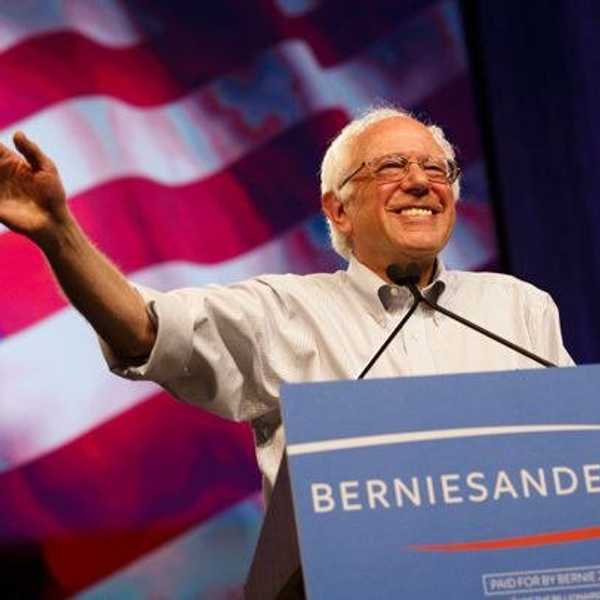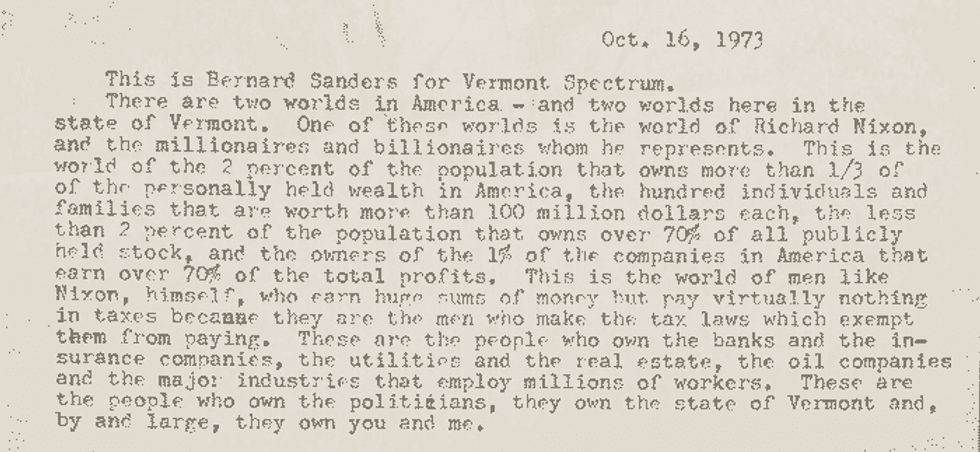Growing up in a small Southern town, use of the words “liberal” or “progressive” would almost warrant your mouth getting washed out with soap. For most residents of Nowhere, Tennessee, it was preferred to be called every swear word in the book before “Democrat.” When did these words become taboo? (Scratch that—we all know the answer to that.) After all, the Merriam-Webster dictionary’s definition of “liberal” is “…associated with ideals of individual especially economic freedom, greater individual participation in government, and constitutional, political, and administrative reforms designed to secure these objectives.” How could something that sounds so positive hold such a negative connotation in the eyes of so many? Because it's a foreign concept? Because it's not the norm? Because it is change? For the first time in any presidential election I can remember, a candidate with this identifier is turning the heads of fellow progressives and conservatives alike. Are things finally bad enough that people are going to listen to the one screaming, “HEY, IF THINGS DON’T DO A 180 SOON THIS COUNTRY IS FINISHED”? Is the majority finally ready to side with the one who isn’t afraid to make waves, the one who isn't afraid to help get the decent people of this great nation onto their own two feet?
Bernard “Bernie” Sanders grew up in a 3 and ½ room home in Brooklyn, New York. Son of a Polish immigrant and New York-born Jew, he and his brother were raised on a paint salesman’s income. At his May 26th presidential campaign announcement, Sanders recalled how his mother had always dreamt of leaving that stuffy apartment, but was never afforded the opportunity before her unseasonable passing. He spoke of the shock his parents would be in at knowing their son was now a Vermont senator, let alone running for president of the United States. Briefly reflecting on his childhood he said, “As a kid, I learned in many ways, every day in my house, what lack of money means to a family, and that is a lesson I have never forgotten and never will forget.”
After high school, Sanders studied at the University of Chicago where he joined in the efforts of the Congress of Racial Equality, the Student Nonviolent Coordinating Committee, the Student Peace Union, and the Young People’s Socialist League. He protested the segregated housing supplied by the college and the segregation of local schools. It wasn’t until 1972, long after graduating with his degree in political science and far from the bustling city, that he raised his hand and volunteered to run as Liberty Union candidate in the 1972 Vermont senate election. Back then, the Liberty Union Party of Vermont was still emerging, so it came as no surprise when Bernie Sanders, candidate of a self-described “nonviolent socialist party”, received only 2% of votes. That very same year, he ran for governor before again trying his hand in the 1974 Senate election. He took a shot at governor once more in ’76, never earning more than 6% of votes.
With the belief that Liberty Union was running low on steam, he gave up campaigning in 1977, but he never gave up his cause. Sanders began making low-budget educational films out of his home that depicted historical people, places, and events in Vermont and New England that were not covered in the region’s schools. In an interview with Politico Magazine, Bernie’s longtime friend Steve Goodkind expressed, “It wasn’t just a way to make money. He made filmstrips about people he admired and believed in. He just thought kids should know the truth of how things really were.”
While reviewing records from Sanders’ previous campaigns, a friend noticed that although his tallies had been scarce, the majority of his support seemed to have come from one area—Burlington: Vermont’s biggest city. It was a long shot, but in March of 1981 Bernie Sanders won his first election by 10 votes. As newly appointed mayor of Burlington, he was now making more than he ever had--$33,800 a year. He served until 1989 when he left to pursue a seat at the capitol. The following year he was elected to congress, where he served as Vermont’s sole Representative for 16 years. The only bump in the road was when Republican opponent, Susan Sweetwater, hired an investigator to look into his background during the 1996 election. Who better to call when digging for dirt than—drum roll please—an ex-wife. Sander’s issued a press-conference saying, “This is the kind of activity that makes politics so distasteful to people in the country and I think encourages people not to participate in the political process, not to vote, and certainly not to run for public office.” He later covered the scenario in his 1997 book, "Outsider in the White House," recalling, “Clearly, Riggs,” the hired investigator, “was hoping to find a disgruntled ex-wife who would spill the beans on her former husband. But that was not going to happen with Deborah, who has been remarried for over 20 years. While we don’t see each other very often, we remain good friends, so Deborah told Riggs where to get off. Her sentiments were reflected all over Vermont.” Sanders had gone on to win the election by more than 20% of the combined points, and he continued to serve until 2006 when he was elected to Senate where he has remained until today.
Lucky for us, this story doesn’t end like most—“Bernie Sanders became a crooked old congressman and died a very rich man”—No, Bernie is still out there pushing the same issues he has been for 40 years. For 40 years, he has been shouting warnings about income and wealth inequality, what the collapse of the middle class means for our country. While the rich continue to get richer, real unemployment which is at 11 percent is dangerously high, millions of Americans still lack health insurance, and more families are living in poverty than at almost any time in the modern history of our country. His campaign page warns, “Our inequality is worse now than at any other time in American history since the 1920s. Today, the top one-tenth of 1 percent of our nation owns almost as much wealth as the bottom 90 percent combined.” For years, Bernie has fought tirelessly against trade agreements that have shut down over 60,000 factories in this country, finding cheaper ways for large international corporations to make their product while 4.9 million Americans are left out of work. Most recently, he has started a petition against the Tran-Pacific Partnership. “During my 23 years in congress, I helped lead the fight against NAFTA and PNTR with China. During the coming sessions of Congress, I will be working with organized labor, environmentalists, religious organizations, Democrats, and republicans against the secretive TPP trade deal.” You can help fight this disaster by clicking here to sign Sander’s petition. (Click here to see what else Bernie is already doing to prevent the collapse of our middle class)
The Supreme Court ruling in the 2010 Citizens United vs. Federal Election Commission made it possible for corporations and the wealthy to spend unlimited and undisclosed money to back candidates, essentially declaring that billionaires and corporations can now buy our officials. Sanders immediately introduced the Democracy Is for People amendment to overturn this decision. He lives out this belief every day of his campaign, which has raised $15 million in the last two months with nearly 87 percent of the total amount coming from small donations of $250 or less. Bernie’s top contributors have always been unions and according to this website, since 2009 the Sheet Metal Workers Union has contributed the most money: $27,500. (Read more here.)
Bernie Sanders made his presidential campaign announcement one beautiful day in May on the banks of Lake Champlain. During his time as mayor of Burlington, he had worked with citizens to take what once was an unsightly rail-yard and turn it into the “people-oriented, public space” it is today. “We took that fight to the courts, to the legislature, and to the people, and we won. The lesson to be learned—and it is a profound political lesson—is that when people stand together, when people are prepared to fight back, there is nothing that cannot be accomplished.” The number of record-breaking crowds attending his speeches, composed of traditional Democrats and conservatives alike, could indicate that Sanders' train of winning streaks may not stop rolling. Addressing issues that both the right and left find important, identifying with people across the political spectrum is something that no other challenger can honestly do. Voting records cannot deny it: To know Bernie Sanders is to love him. Just two months ago, most Americans had no idea who he is. Today, a wave of supporters are swelling that has the Clinton administration on the toes of their designer shoes. A Bernie Sanders win would prove that America’s democracy is still a democracy—that the support the people is more powerful that money.
Bernie Sanders has the anecdote to save our dwindling economy, crumbling government, and dying world, but it is going to take the efforts of honest Americans, me and you, to make a change that rattles Washington. A tidal wave is coming. The only option is whether you will aid in its force or drown.






















